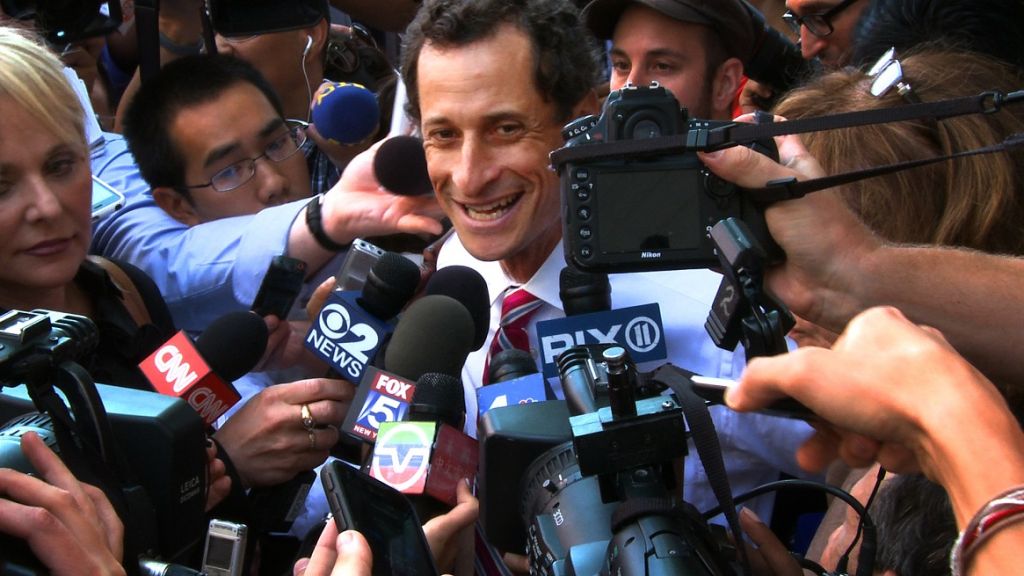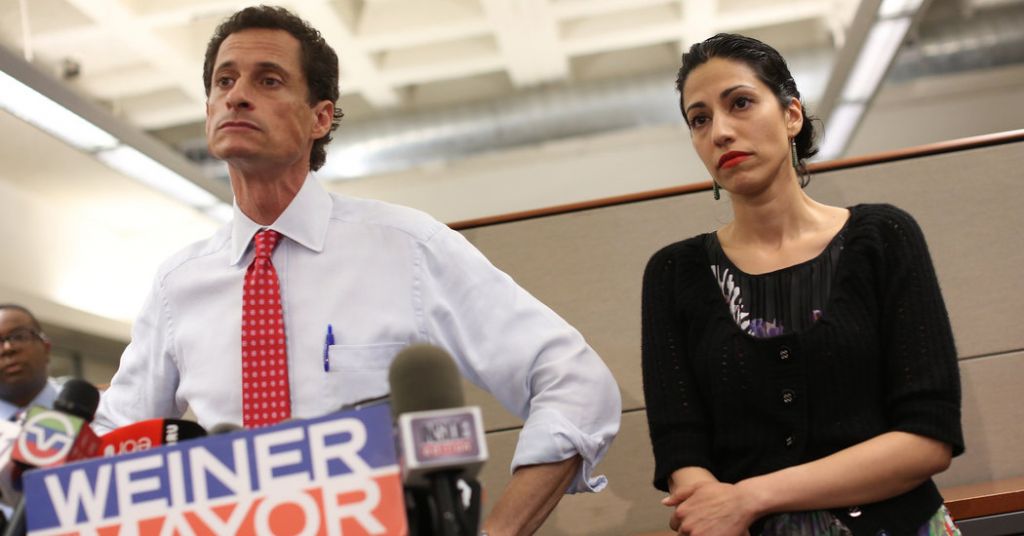Mayor culpa: Weiner film explores sexting scandal
Disgraced American-Jewish politician Anthony Weiner invited cameras along during his run for New York mayor - but he didn't quite get the ending he hoped for...
“You don’t typically start off a political documentary and think you’re going to end with a chase scene,” quips director Josh Kriegman.
But then again we’re talking about Anthony Weiner, the disgraced former Congressman caught up in multiple sexting scandals and the subject of an eye-opening documentary released in cinemas tomorrow (Friday).
Never one to hold back about his thoughts on gay rights, drug reforms, and environmental bills, just a few years ago, the American-Jewish politico was a rising star for the Democrats on Capitol Hill.
Get The Jewish News Daily Edition by email and never miss our top stories Free Sign Up
His wife Huma Abedin was equally well-regarded, having been a close personal aide to Hillary Clinton and, when the couple married in 2010, it was former President Bill Clinton who officiated.
But his career came crashing around the newlywed power couple when, just a year later, Weiner sent a sexually explicit photograph of himself to a female Twitter follower via his public account.
He was forced to admit he had initially lied to the media (which spared no punches in coming up with innuendo-filled puns around his surname) and had sexted no fewer than six women over three years, leading to his resignation.
In May 2013, Weiner asked voters to give him “a second chance” when he announced his candidacy in the New York mayoral race.

He had hoped to resurrect his political career and get his marriage to Abedin back on track after a very public humiliation.
Most remarkably, he invited the cameras in to follow his comeback story.
“She [Huma] was very eager to get her life back that I had taken from her, to clean up the mess I had made – and running for mayor was the straightest line to do it,” Weiner reveals in the film.
For Kriegman, who worked with the flamboyant politician as his chief of staff and spent a decade in politics before turning to film-making, and co-director Elyse Steinberg, the chance to follow Weiner was “something we couldn’t pass up”.
But what was in it for Weiner?
Kriegman, 36, explains: “He had gone through this experience of having his whole career, a few decades of his life’s work, wiped out because of this one thing. He had very much been reduced to a punchline and understood that there could be a version of the story that was more complete.”
Steinberg, also 36, who received critical acclaim for her PBS documentary about the trial of Saddam Hussein, enthuses about how, at the start of the project, she and Kriegman captured the rolling momentum of Weiner’s campaign and obvious popularity with the voters.
“He shot to the top of the polls and we looked at one another, wondering if he really could become mayor,” says Steinberg. “We thought we could have one of the most incredible comeback stories in recent American political history.”
But the twists and turns of this vérité documentary were yet to reveal themselves in ways the directing team could never have predicted.

Two months into the campaign, a second sexting scandal broke, this time with allegations Weiner had continued to send explicit messages to at least three women as late as April 2013, more than a year after he had left Congress.
For a man who didn’t like being reduced to a “punchline”, it certainly didn’t help that the texts were sent under the pseudonym ‘Carlos Danger’, or as American talk show host Stephen Colbert later quipped: “I suppose it was to avoid using a ridiculous name, like ‘Anthony Weiner’.
Inevitably, the documentary became less about Weiner’s political return and more about how he would ride the fallout of this latest scandal.
“While the story changed, our intention stayed the same,” says Steinberg, who was adamant the end goal of her documentary was to show Weiner as he is perceived in public, but also behind closed doors.
As such, the film shows the campaign’s gradual demise, from attempting to bolster his teary-eyed staff to sparring with an angry voter in a kosher bakery and engaging in verbal punches with MSNBC show host Lawrence O’Donnell after he asks straight out: “What is wrong with you?”
But it also shows Weiner’s softer side, as a caring father to his young son, Jordan, and as a husband concerned about the scandal’s impact on Abedin.
The marital tension is palpable amid the detritus of Weiner’s indiscretions.
When at one point the camera asks how she is feeling, Abedin simply mutters: “It’s like living a nightmare.”
In between the gaps of his public and personal struggles, the film sheds a spotlight on why Weiner refused to pull out of the race – even when he had absolutely no chance of winning.
As Steinberg believes: “He genuinely cared about what he was arguing for and didn’t want to quit because of the scandal.”
Kriegman adds: “Anthony Weiner is certainly not an average person. Most people would not be willing to put themselves out there in the way he did.
“He said he’s not the kind of person to curl up into a corner just because somebody found something embarrassing about him. For many of us, that’s exactly what we would do, but he has an unusual capacity to act otherwise.”
Indeed, only a documentary about Weiner could conclude with something straight out of a bedroom farce. In the final minutes, we see the defeated candidate (who rustled up less than five percent of the vote) running out of his SUV, through the back entrance of McDonalds and up a dimly-lit staircase to avoid the classilynamed
Sydney Leathers, the 22-year-old sexting partner who wanted to make a scene by confronting him outside his election night party.
Just as you thought the real-life slapstick had come to an end, the staffer reveals they refer to Leathers by her codename: “Pineapple”.
Despite being invited to see the film even before it was finished, both Weiner and his wife have so far declined.
“He’s not eager to relive that time in his life and we respect that,” says Steinberg.
For those who do watch the film, which was handed the grand jury documentary prize at Sundance, it’s an opportunity to see beyond the sexting scandals and understand the “rich complexity” of a man like Weiner.
“He has these moments of insight and selfawareness, but then also blindness,” Steinberg concludes. “For many people who see the film, it’s an enlightening experience and they do walk away with a different impression of him.”
Weiner (15) is out in cinemas from Friday

Thank you for helping to make Jewish News the leading source of news and opinion for the UK Jewish community. Today we're asking for your invaluable help to continue putting our community first in everything we do.
For as little as £5 a month you can help sustain the vital work we do in celebrating and standing up for Jewish life in Britain.
Jewish News holds our community together and keeps us connected. Like a synagogue, it’s where people turn to feel part of something bigger. It also proudly shows the rest of Britain the vibrancy and rich culture of modern Jewish life.
You can make a quick and easy one-off or monthly contribution of £5, £10, £20 or any other sum you’re comfortable with.
100% of your donation will help us continue celebrating our community, in all its dynamic diversity...
Engaging
Being a community platform means so much more than producing a newspaper and website. One of our proudest roles is media partnering with our invaluable charities to amplify the outstanding work they do to help us all.
Celebrating
There’s no shortage of oys in the world but Jewish News takes every opportunity to celebrate the joys too, through projects like Night of Heroes, 40 Under 40 and other compelling countdowns that make the community kvell with pride.
Pioneering
In the first collaboration between media outlets from different faiths, Jewish News worked with British Muslim TV and Church Times to produce a list of young activists leading the way on interfaith understanding.
Campaigning
Royal Mail issued a stamp honouring Holocaust hero Sir Nicholas Winton after a Jewish News campaign attracted more than 100,000 backers. Jewish Newsalso produces special editions of the paper highlighting pressing issues including mental health and Holocaust remembrance.
Easy access
In an age when news is readily accessible, Jewish News provides high-quality content free online and offline, removing any financial barriers to connecting people.
Voice of our community to wider society
The Jewish News team regularly appears on TV, radio and on the pages of the national press to comment on stories about the Jewish community. Easy access to the paper on the streets of London also means Jewish News provides an invaluable window into the community for the country at large.
We hope you agree all this is worth preserving.
-
By Laurent Vaughan - Senior Associate (Bishop & Sewell Solicitors)
-
By Laurent Vaughan - Senior Associate (Bishop & Sewell Solicitors)
-
By Laurent Vaughan - Senior Associate (Bishop & Sewell Solicitors)
-
By Laurent Vaughan - Senior Associate (Bishop & Sewell Solicitors)






















